Friendship During Grief: Supporting Loved Ones Through Loss
Friendship During Grief: Supporting Loved Ones Through Loss
Grief can change friendships in unexpected ways. Some friends step up with amazing support, while others fade away.
Friendship during grief often involves simply being there, even when words fail.
Your grieving friend may need different types of support at different times. Sometimes they’ll want to talk about their loss. Other times, they may prefer a distraction.
The key is to listen without judgment and follow their lead.
Remember, there’s no perfect way to support a grieving friend. Small acts of kindness can mean a lot.
Offering practical help, like bringing meals or running errands, can be just as valuable as emotional support. Your presence and patience are often the most important gifts you can give.
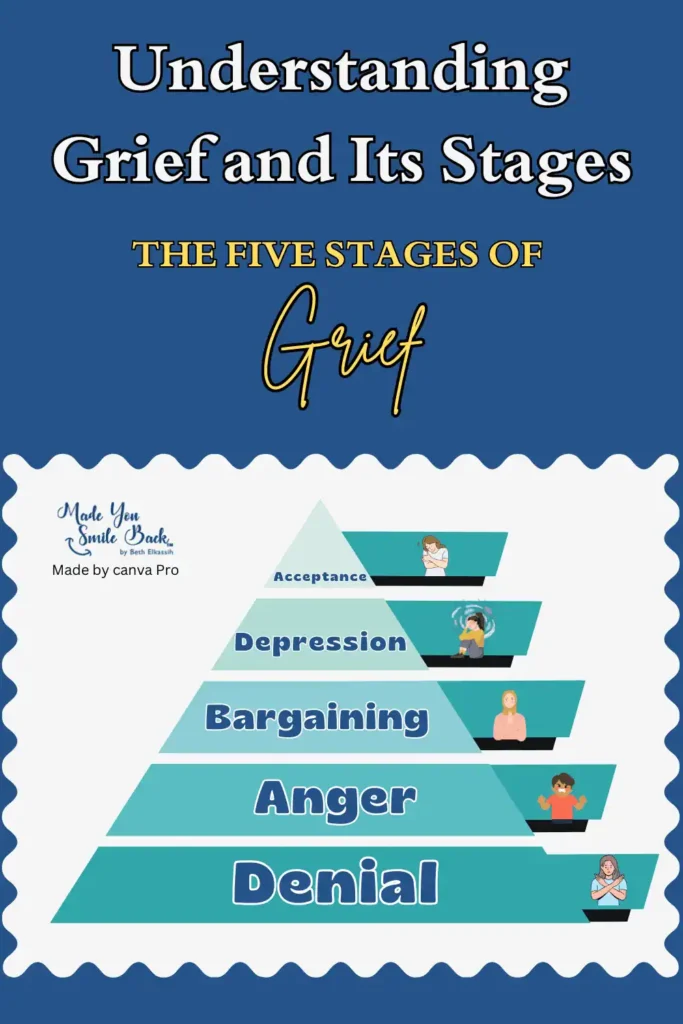
Understanding Grief and Its Stages
Grief is a complex emotional journey that follows loss. The process involves several stages and can vary from person to person.
Let’s explore the common stages of grief and how they differ from complicated grief.
The Five Stages of Grief
The five stages of grief are denial, anger, bargaining, Depression, and acceptance. These stages aren’t always linear and you may go back and forth between them.
Denial often comes first. You might feel numb or refuse to believe the loss has happened. This helps you cope with the initial shock.
Anger follows as reality sets in. You may feel mad at others, yourself, or even the person you lost. This is normal and part of healing.
Bargaining involves trying to regain control. You might make deals with yourself or a higher power to undo the loss.
Depression brings deep sadness. You may withdraw from others and feel hopeless. This stage shows you’re starting to accept the loss.
Acceptance doesn’t mean you’re happy about the loss. It means you’ve come to terms with it and are ready to move forward.
Complicated Grief vs. Normal Grief
Normal grief fades over time. You start to adjust to life without your loved one.
Complicated grief is different.
In complicated grief, intense sorrow persists. You may have trouble accepting the loss or returning to daily life. Some signs include:
- Extreme focus on the loss
- Intense longing for the deceased
- Difficulty maintaining Relationships
- Feeling life is meaningless
If you’re stuck in grief for a long time, it’s important to seek help. A Mental Health professional can provide support and guide you through the healing process.
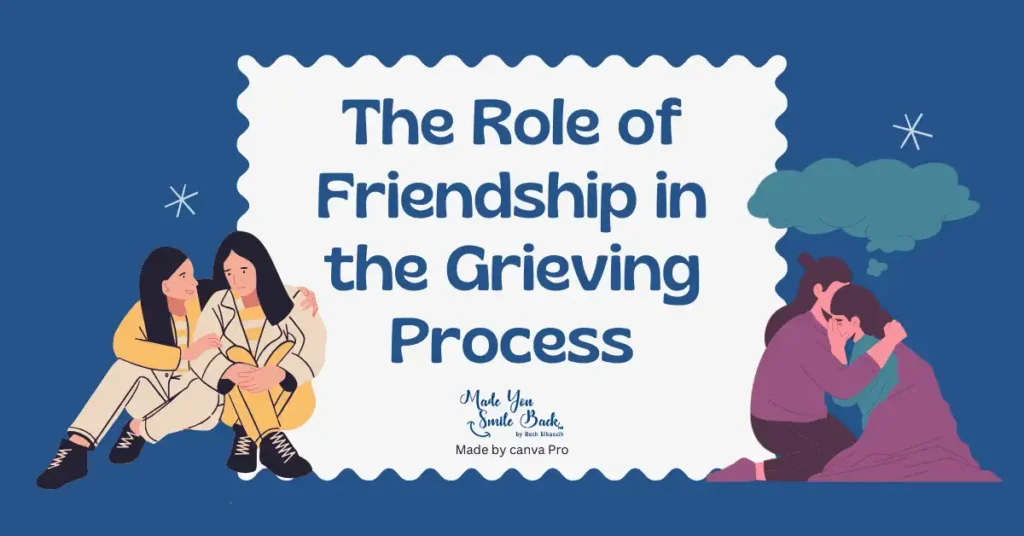
The Role of Friendship in the Grieving Process
Friends play a crucial part in helping you cope with loss. They offer comfort and understanding during difficult times.
Let’s explore how friendship impacts the grieving process.
Providing Emotional Support
When you’re grieving, friends can be a lifeline. They listen without judgment and validate your feelings. This emotional backing helps you process your loss.
Friends create a safe space for you to express yourself. You can share memories, cry, or just sit in silence together. Their presence alone can be comforting.
Emotional support from friends is vital for healing. They might offer a shoulder to lean on or simply check in regularly. This consistent care shows you’re not alone in your grief journey.
Friends can also help with daily tasks that feel overwhelming. They might bring meals, help with errands, or assist with practical matters. This support allows you to focus on your emotional needs.
Maintaining Contact and Continuing Bonds
Friends help keep the memory of your loved one alive. They share stories and reminisce about happy times. This helps you maintain a connection with the person you’ve lost.
Staying in touch is important, even as time passes. Good friends continue to reach out long after the funeral. They understand grief doesn’t have a timeline.
Friends can join you in honoring your loved one’s memory. This might include visiting special places or participating in memorial activities. These shared experiences strengthen your bond and support your healing.
Sometimes, friends introduce you to support groups. Meeting others who are grieving can be helpful. It provides a sense of community and shared understanding.
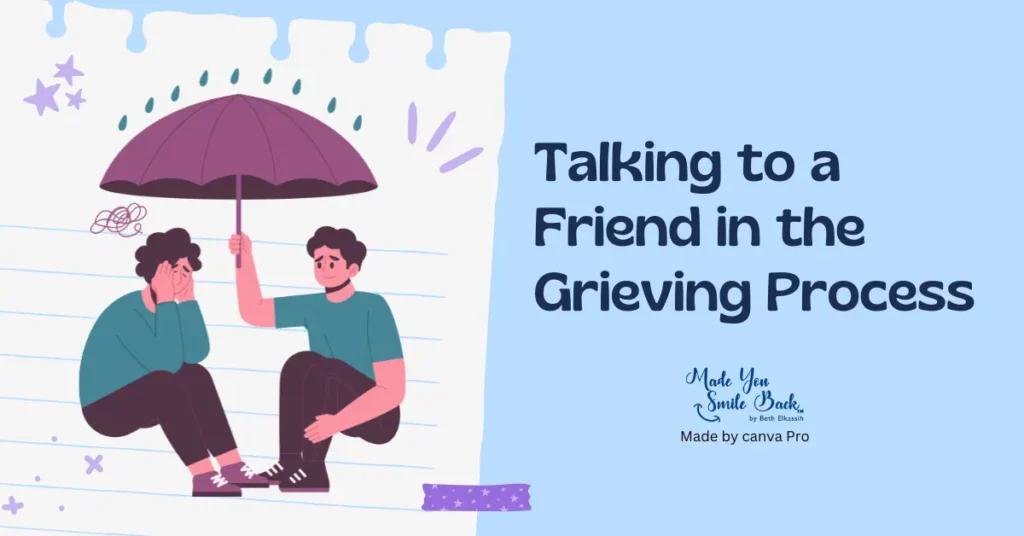
Talking to a Friend in the Grieving Process
Talking to a grieving friend can feel difficult. You may worry about saying the wrong thing. But your support matters, even if you’re unsure what to say.
Acknowledging the Loss
Start by acknowledging their loss. Say something like “I’m so sorry for your loss” or “I heard about [name]. My heart goes out to you.” Use the name of the person who died.
Avoid phrases like “They’re in a better place” or “Everything happens for a reason.” These can feel dismissive.
Ask how they’re doing, but don’t expect a detailed response. Let them share as much or as little as they want.
Be willing to sit in silence. Your presence alone can be comforting.
Being a Good Listener
Listen more than you talk. Let your friend express their feelings without judgment.
Don’t try to fix their pain or offer advice. Simply validate their emotions.
Ask open-ended questions like:
- “What’s been the hardest part?”
- “How are you managing day-to-day?”
- “What memories of [name] have been on your mind?”
Remember, there’s no timeline for grief. Be patient and continue checking in over time.
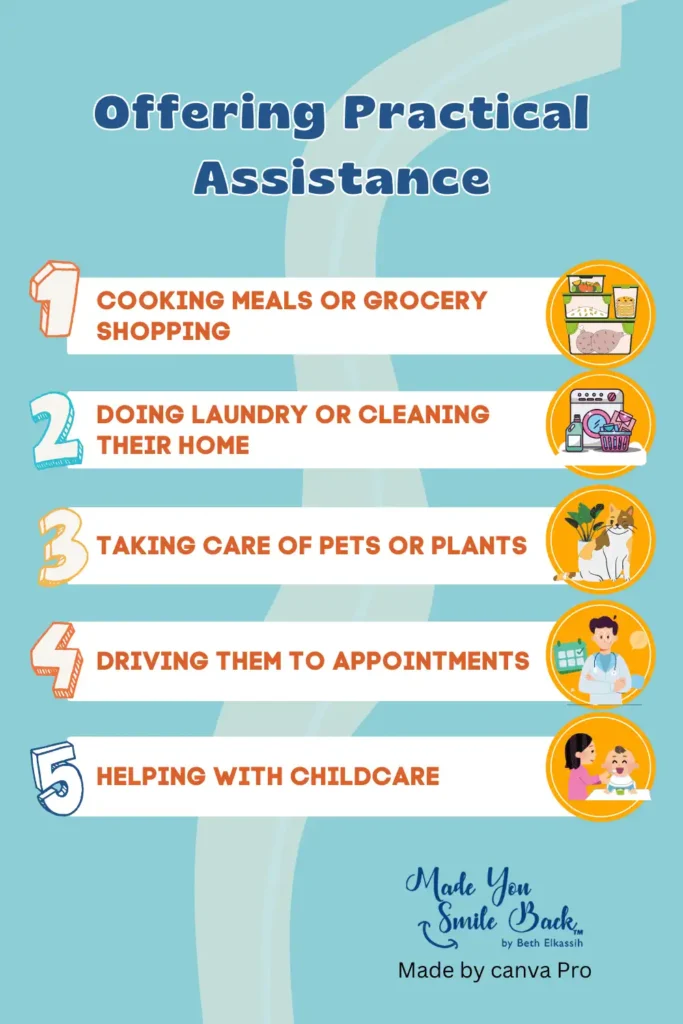
Supportive Actions During Grief
Grief can be overwhelming. You can help your grieving friend by offering practical support and encouraging self-care. These actions show you care and want to ease their burden during a difficult time.
Offering Practical Assistance
When your friend is grieving, everyday tasks can feel impossible. You can help by:
- Cooking meals or grocery shopping
- Doing laundry or cleaning their home
- Taking care of pets or plants
- Driving them to appointments
- Helping with childcare
Don’t wait to be asked. Take initiative and offer specific help. Say “I’ll mow your lawn on Saturday” instead of “Let me know if you need anything.”
Remember, small gestures matter too. Bring over coffee, pick up their mail, or simply sit with them in silence.
Encouraging Self-Care and Professional Help
Grief can be all-consuming. Remind your friend to take care of themselves. Suggest:
- Getting enough Sleep
- Eating regular, healthy meals
- Taking short walks or doing gentle exercises
- Practicing relaxation techniques like deep breathing
If grief feels overwhelming, encourage seeking professional help. Offer to help find a therapist or support group. You might say, “Would you like me to research grief counselors in our area?”
Remember, healing takes time. Be patient and keep checking in, even months after the loss.
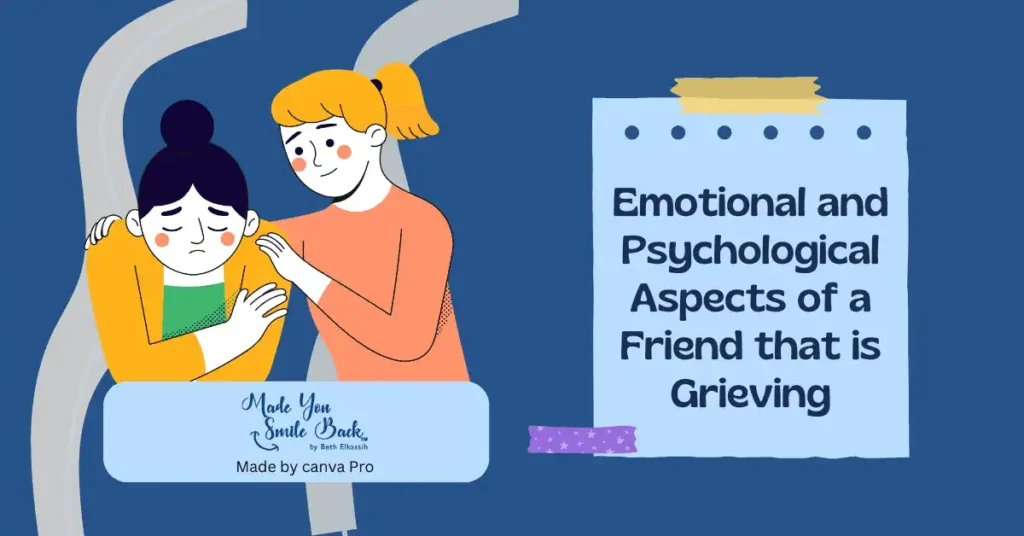
Emotional and Psychological Aspects of a Friend that is Grieving
Grief affects people deeply, changing how they feel and think. It can cause many strong emotions and impact mental health in different ways.
Dealing with Emotions of Grief
When you’re grieving, you may feel very sad. This sadness can come in waves and last for a long time. You might cry a lot or feel numb.
Anger is also common. You might be mad at the person who died, yourself, or others. This anger is normal and part of the process.
Guilt often shows up too. You may think about things you wish you’d said or done differently. Try to be kind to yourself during these times.
Loneliness can hit hard, even when people are around. You might feel like no one understands what you’re going through.
Understanding the Psychological Impact
Grief can change how your mind works. You might have trouble focusing or remembering things. This is your brain’s way of coping with the loss.
Depression is a risk during grief. If you feel hopeless or can’t do daily tasks, talk to a doctor. They can help you tell the difference between normal grief and depression.
Anxiety might increase too. You could worry more about other people dying or about your own death. These fears are normal but can be hard to deal with.
Your sleep might change. You could have trouble falling asleep or wake up a lot. Some people sleep more than usual when grieving.
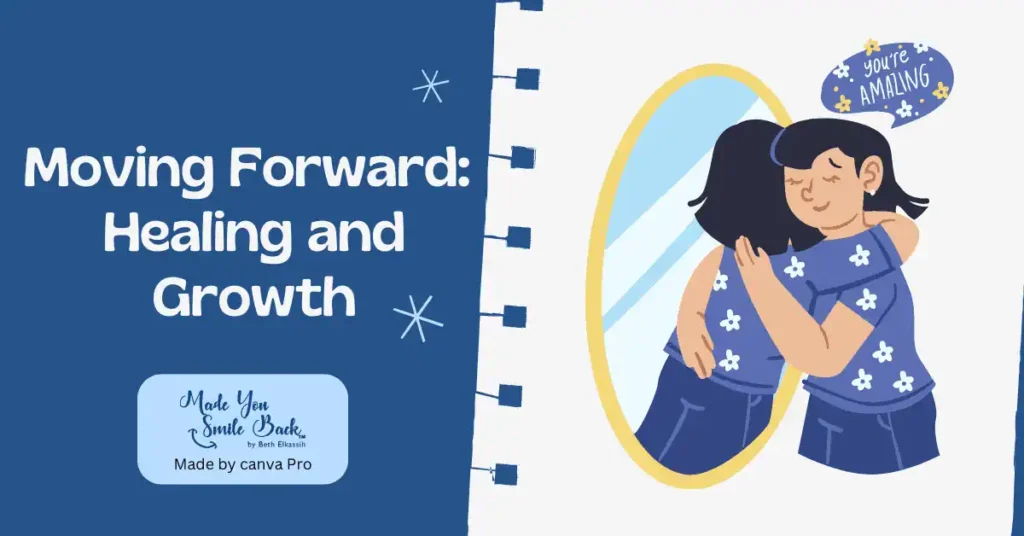
Moving Forward: Healing and Growth
Grief can be a chance for personal Growth. You can find ways to cope and heal while honoring your lost friendship.
Coping Strategies and Healing Activities
Writing can help you process your feelings. Start a journal to record memories and emotions about your friendship. This lets you express yourself freely.
Exercise is good for your mood. Take walks, join a gym, or try Yoga. Physical activity releases endorphins that make you feel better.
Seek support from other friends and family. Talk to them about your loss. Sharing your grief can make it easier to bear.
Try new hobbies or activities. Learn a skill you’ve always wanted to try. This can boost your confidence and give you something positive to focus on.
Transforming Grief into Meaningful Action
Turn your loss into something positive. Volunteer for a cause your friend cared about. This honors their memory and helps others.
Make a photo album or memory box. Gather items that remind you of good times with your friend. This celebrates your relationship.
Reach out to someone who’s also grieving. Your experience can help others cope. Sharing support improves everyone’s quality of life.
Set new goals for yourself. Use this time to think about what you want in life. Make plans to achieve those aims. This helps you move forward while remembering your friend.
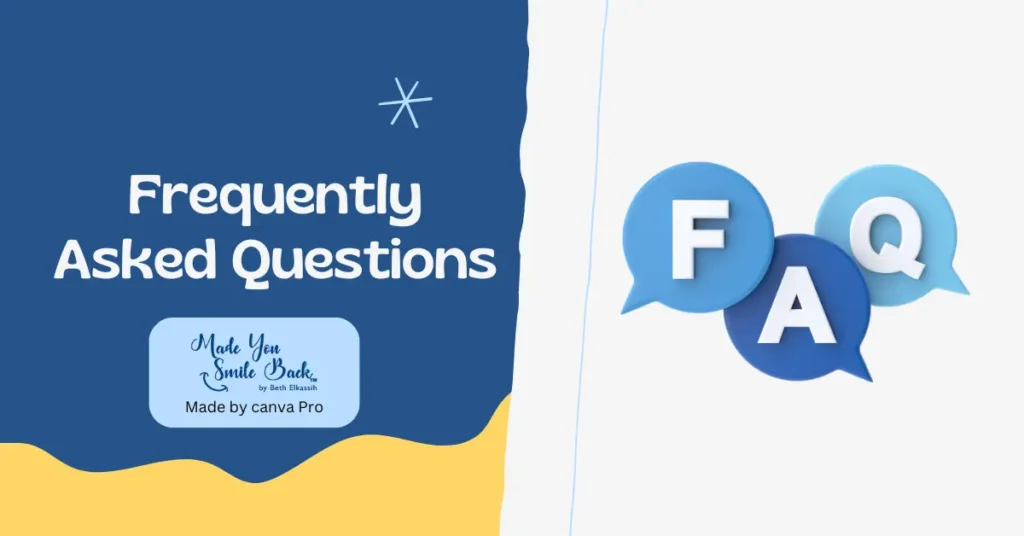
Frequently Asked Questions
Grief can deeply impact friendships.
Supporting grieving friends takes care and understanding.
Friendships may change during grief, but there are ways to maintain connections.
How can I support a friend who is going through grief?
Be present for your friend.
Listen without judgment. Offer practical help like running errands or cooking meals.
Emotional support is key.
Let your friend know you care. Check in regularly, even if they don’t always respond.
What can cause friendships to change during the grieving process?
Grief can make people withdraw.
Your friend may have less energy for socializing. Their priorities and outlook may shift.
You may feel unsure how to act around them. Open communication helps navigate these changes.
How might grief affect my relationships with close friends?
Grief can strain friendships.
You may feel your friends don’t understand your pain. Some may avoid you, unsure what to say.
Other friendships may grow stronger. Shared experiences of loss can deepen bonds.
What should I do if I feel abandoned by friends after a loss?
Reach out to friends. Tell them how you feel. They may not realize you need support.
Seek new connections through grief support groups.
Consider talking to a therapist about your feelings.
How can I cope with anger towards friends who seem distant during my grief?
Recognize that people often don’t know how to respond to grief.
Try to express your needs clearly.
Take breaks from friendships if needed.
Focus on self-care and healing.
What are some ways to maintain friendships while dealing with the loss of a loved one?
Be honest about your limitations.
Let friends know when you need space or support.
Plan low-key activities together.
Short coffee dates or walks can help maintain connections without overwhelming you.
Stay in touch through texts or emails when you don’t feel up to in-person meetings.
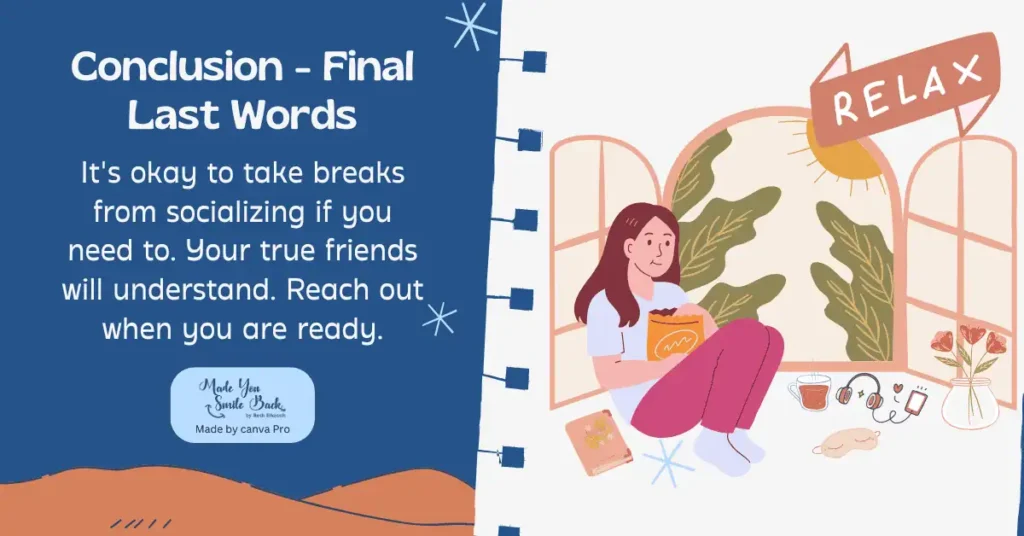
In Conclusion – Final Last Words
In conclusion, remember grief can change friendships. Some friends may offer great support, while others might drift away.
It’s normal and okay. You might feel alone or misunderstood. Your needs and emotions can shift quickly.
Be patient with yourself and others.
Talking about your feelings can help. Let friends know what you need. Sometimes just being there is enough.
Good friends can help you heal. They can:
- Listen without judgment
- Offer practical help
- Remind you to take care of yourself
- Share happy memories
It’s okay to take breaks from socializing if you need to. Your true friends will understand. Reach out when you are ready.
Yes, you can get through this. Yes, it can be difficult and challenging, but having true friends who really ‘listen’ and know you will ALWAYS be a text or phone call away!
.lwrp.link-whisper-related-posts{
margin-top: 40px;
margin-bottom: 30px;
}
.lwrp .lwrp-title{
}.lwrp .lwrp-description{
}
.lwrp .lwrp-list-container{
}
.lwrp .lwrp-list-multi-container{
display: flex;
}
.lwrp .lwrp-list-double{
width: 48%;
}
.lwrp .lwrp-list-triple{
width: 32%;
}
.lwrp .lwrp-list-row-container{
display: flex;
justify-content: space-between;
}
.lwrp .lwrp-list-row-container .lwrp-list-item{
width: calc(25% – 20px);
}
.lwrp .lwrp-list-item:not(.lwrp-no-posts-message-item){
}
.lwrp .lwrp-list-item img{
max-width: 100%;
height: auto;
object-fit: cover;
aspect-ratio: 1 / 1;
}
.lwrp .lwrp-list-item.lwrp-empty-list-item{
background: initial !important;
}
.lwrp .lwrp-list-item .lwrp-list-link .lwrp-list-link-title-text,
.lwrp .lwrp-list-item .lwrp-list-no-posts-message{
}@media screen and (max-width: 480px) {
.lwrp.link-whisper-related-posts{
}
.lwrp .lwrp-title{
}.lwrp .lwrp-description{
}
.lwrp .lwrp-list-multi-container{
flex-direction: column;
}
.lwrp .lwrp-list-multi-container ul.lwrp-list{
margin-top: 0px;
margin-bottom: 0px;
padding-top: 0px;
padding-bottom: 0px;
}
.lwrp .lwrp-list-double,
.lwrp .lwrp-list-triple{
width: 100%;
}
.lwrp .lwrp-list-row-container{
justify-content: initial;
flex-direction: column;
}
.lwrp .lwrp-list-row-container .lwrp-list-item{
width: 100%;
}
.lwrp .lwrp-list-item:not(.lwrp-no-posts-message-item){
}
.lwrp .lwrp-list-item .lwrp-list-link .lwrp-list-link-title-text,
.lwrp .lwrp-list-item .lwrp-list-no-posts-message{
};
}
The post Friendship During Grief: Supporting Loved Ones Through Loss appeared first on Made You Smile Back.























